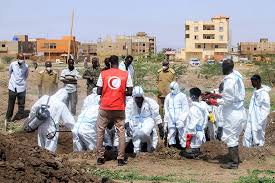News Flash

PORT SUDAN, Sudan, Aug 10, 2025 (BSS/AFP) - Malnutrition has killed 63 people, mostly women and children, in just one week in Sudan's besieged city of El-Fasher, a senior health official said Sunday, as fighting between the army and rival paramilitaries intensifies in the western region.
The official from North Darfur's health ministry, who spoke to AFP on condition of anonymity, said the death toll only included those who managed to reach hospitals, adding that many families buried their dead without seeking medical help due to poor security conditions and a lack of transportation.
Since May last year, El-Fasher, the capital of North Darfur, has been under siege by the paramilitary Rapid Support Forces (RSF), which has been battling Sudan's regular army since April 2023.
The city remains the last major Darfur urban centre in army control, and has recently come under renewed attack by the RSF after the group withdrew from Sudan's capital Khartoum earlier this year.
A major RSF offensive on the nearby Zamzam displacement camp in April forced tens of thousands of people to flee again -- with many of them now sheltering inside El-Fasher.
Community kitchens, once a lifeline, have largely shut down due to a lack of supplies. Some families are reported to be surviving on animal fodder or food waste.
- Swollen bellies -
At the largest community kitchen in the city, around 1,700 people receive the traditional Sudanese dish aseeda -- a porridge made from millet or sorghum flour -- every morning, but portions have shrunk dramatically.
"Six months ago, we served two meals daily, but now, due to shortages and dry markets, only one meal is provided," Magdi Youssef, one of the kitchen's managers, told AFP.
He added a plate once shared by three people is now eaten by seven.
Children and women arriving at the kitchen show clear signs of malnutrition, including swollen bellies and sunken eyes, Youssef said.
According to UN figures, nearly 40 percent of children under five in El-Fasher are now acutely malnourished, with 11 percent suffering from severe acute malnutrition.
Famine was declared a year ago in the displacement camps surrounding El-Fasher, and the UN estimated it would take hold in the city itself by last May. A lack of data has prevented an official famine declaration.
The UN has repeatedly warned of the plight of an estimated one million people trapped in El-Fasher and its surrounding camps, who are virtually cut off from aid and basic services.
The World Food Programme said this week that thousands of families in El-Fasher are "at risk of starvation".
An attack on a UN humanitarian convoy heading towards the city in June killed five aid workers.
The rainy season, which peaks in August, is further complicating efforts to reach the city. Roads are rapidly deteriorating, making aid deliveries difficult if not impossible.
- Fear -
The war, now in its third year, has killed tens of thousands, displaced millions and created what the United Nations describes as the world's largest displacement and hunger crises.
"Those eating at the community kitchen are still hungry," Youssef said.
"I see fear in the children's eyes because of food scarcity," he added.
A paediatrician at El-Fasher hospital reported a surge in critically malnourished children arriving at the facility.
"Most cases are severely malnourished and medical supplies to treat them are dangerously low," she told AFP.
In the nearby famine-stricken Abu Shouk camp, community leader Adam Essa told AFP he had just returned from burying five children.
He said the child mortality rate in the camp ranges between five and seven deaths daily.
Across Sudan, nearly 25 million people are suffering dire food insecurity.
UNICEF's Sudan representative Sheldon Yett called the situation this week a "looming catastrophe".
"We are on the verge of irreversible damage to an entire generation of children."